The high price of desperation: How a $3,000 repair ballooned into a $14,000 debt
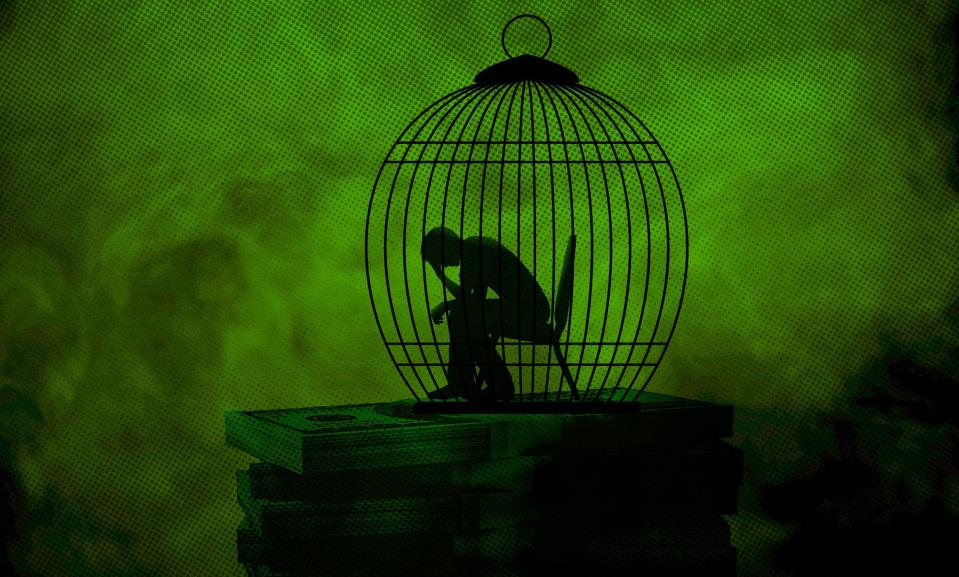
James Hollis, who lives on Social Security disability and $23 in monthly food stamps, was so afraid lenders would repossess his blue 2006 Ford Crown Victoria in July that he began parking it sideways in his carport to make it harder to pull out.
The converted former police cruiser was his only major asset, and he worried that after missing payments on $3,050 in loans that month, he was in his lenders' crosshairs.
Hollis, 57, had taken out the loans to fix the car's transmission But even after a friend helped him catch up on the installments, he struggled to pay for gas, food and housing in Tucson, Arizona, he said.
In dire straits, he decided to refinance one car title loan with another to lower his payment by $10 a month, but he said it added about $1,700 in interest.
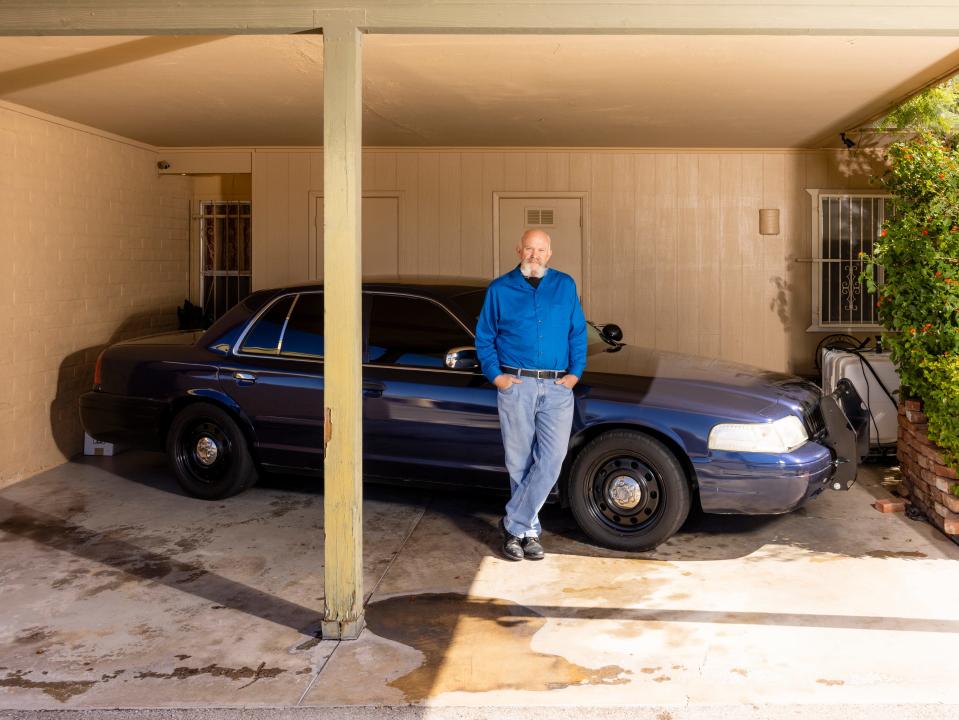
Now, his limited income goes to the $427 monthly payment on a pair of car title loans that come with interest rates of nearly 155% and 202%. He wants to end the fears of having his car repossessed, which will cost him $10,741 in interest.
"They know these customers, such as myself, will be willing to put their signature on that piece of paper regardless of how much interest it's going to cost them," Hollis told USA TODAY in an interview. "At that moment, that customer is in an emergency situation or just needs the money badly."
But the consequence is even more financial hardship.
Related video: House votes to raise debt ceiling for several more weeks
"I'm really barely staying above water," he said.
Financial watchdogs say Hollis is among millions of low-income Americans, including many with poor credit scores, who are the targets of a predatory loan industry, which offers quick, small-dollar loans with triple-digit interest rates to consumers who are unable to get money from mainstream banks or credit unions.
The lending, they say, includes car title loans like Hollis' that require a person to use their vehicle as collateral; payday loans that require them to repay the debt with their next paycheck; and so-called rent-a-bank operations, where fintech or financial technology companies partner with banks in states with no limits on interest rates to offer uncollateralized installment loans in states that have interest rate caps.
Raising Alarm on high-interest loans: Consumer watchdogs raise alarms as more consumers rely on high-interest 'rent-a-bank' loans
Inflation squeezing the poor: No more steak. Ordering out less. Here's how inflation is squeezing American diets.
USA TODAY is examining these loans as critics and supporters agree that they are becoming common across the country. Driving the trend is the staggering level of inflation gripping low-wage earners who need help paying for purchases over several installments.
A small bipartisan group in Congress wants to cut the cost of those loans by passing national legislation that would limit interest rates to 36%, the maximum charged on any loans made to active service members and their families after a law enacted 16 years ago.
"You don't want businesses that rely on other people's bad choices," said Rep. Glenn Grothman, R-Wis., the lone Republican in the group. "Why should we allow someone to set up a business model that depends on people's financial inexperience?"
But some lenders are fighting the effort by lobbying and making campaign contributions to lawmakers who want to keep the status quo.
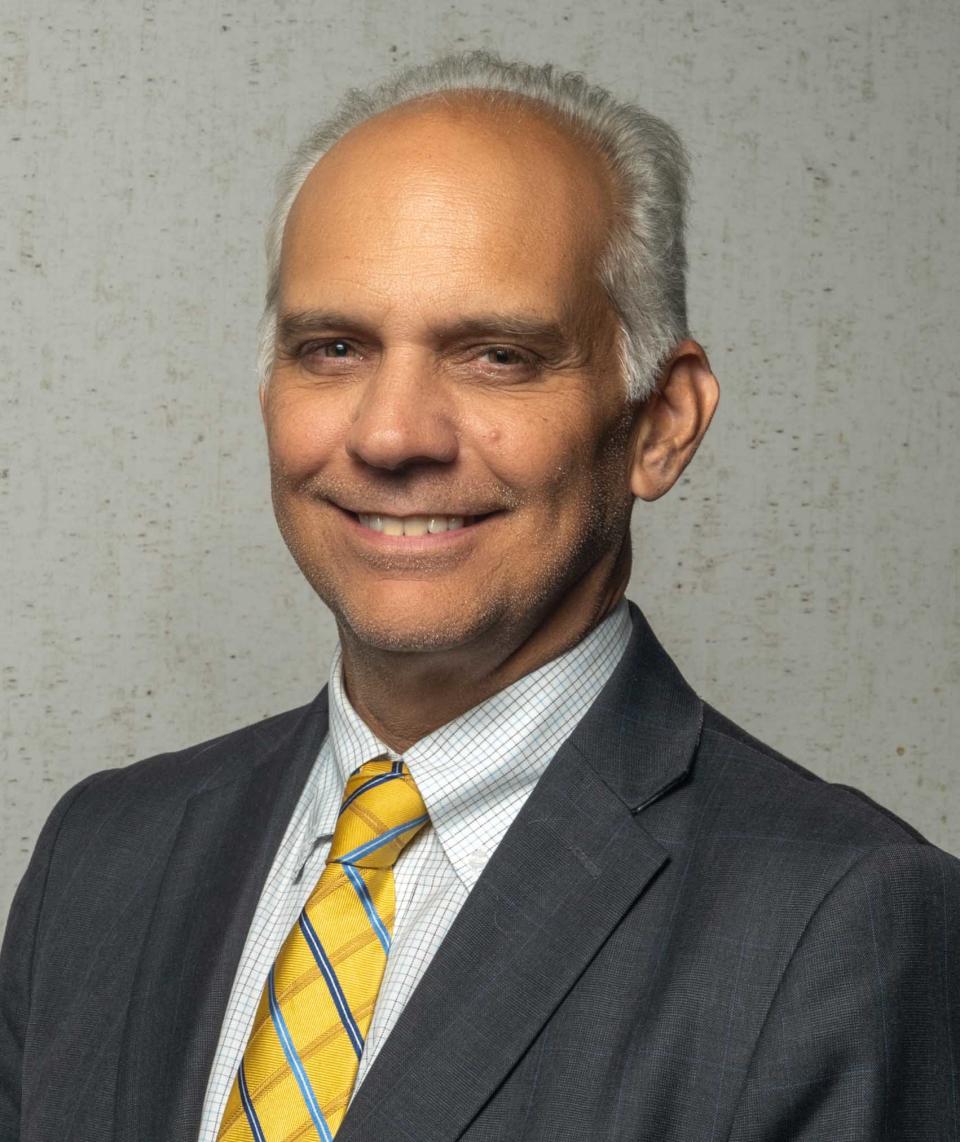
"We have opposed a federal rate cap and have openly expressed our concerns and opposition to the rate cap proposal in communications with Congress," said Andrew Duke, who served two decades on Capitol Hill and is now executive director of the 130-member Online Lenders Alliance.
Duke, formerly chief of staff to three members of Congress, said federal lawmakers "should embrace innovation to empower consumers with more options and solutions to help them manage their financial needs."
He added that many members of Congress "understand that when you impose a rate cap, you are going to curtail access for those who are below prime," referring to customers with a credit score of 659 or less. By comparison, an excellent score is 800, which usually results in borrowing with low-interest rates.
.oembed-frame {width:100%;height:100%;margin:0;border:0;}
Duke, who was chief of staff to Republicans Jeb Hensarling of Texas (2011-2018), Phil Roe of Tennessee (2009-2010) and Robin Hayes of North Carolina (1999-2008), said about one-third of Americans have credit scores that are below prime.
And at least 12 million Americans used small-dollar loans in 2015, and the demand has grown substantially, according to economist Howard Beales, former director of the federal Bureau of Consumer Protection.
Chicago-based Enova, a fintech company that made $256 million in profit last year, said in its 2021 annual report that the short-term lending market comprises 68 million Americans, according to industry data. The company's subprime customer base is made up of households earning $41,000 a year, while its near-prime customers make an average of $58,000 a year, the company said.
The median household income in the U.S. was $70,784 in 2021, according to the U.S. Census Bureau. That figure is the exact middle of all household income distributions; an average salary is the sum of all compensation divided by the total number of earners.
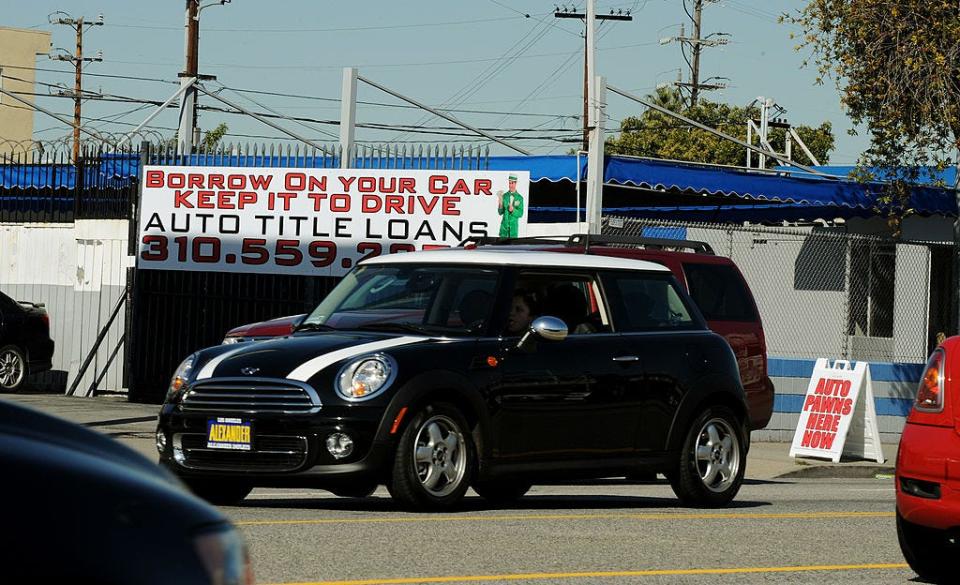
Pushing a 36% interest rate cap
Grothman is among a half-dozen lawmakers who since 2019 have pushed for a national interest rate cap of 36% on all consumer loans. Though there is support in the House and Senate, the legislation has yet to gain traction for a vote.
Several faith-based organizations and financial watchdogs like the National Consumer Law Center, a nonprofit organization that works for economic justice for low-income and other disadvantaged people, have supported the legislation.
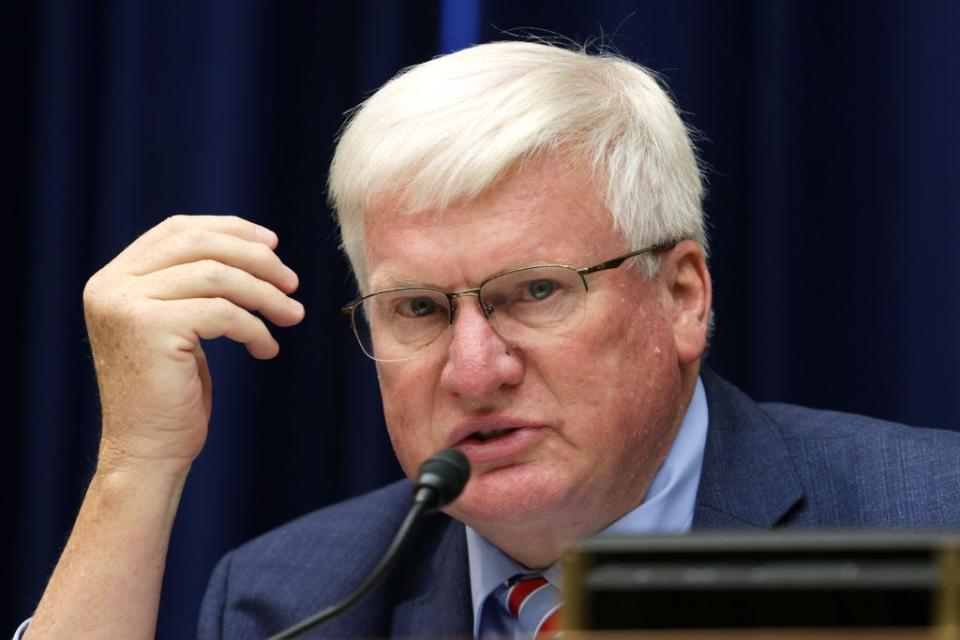
The National Consumer Law Center says a 36% rate cap has been supported in conservative and liberal states alike, and an interest rate limit promotes racial justice and discourages a debt trap for short-term loans.
At least 34 states and the District of Columbia have limits on lending rates, known as usury caps, of 33% or lower for larger, longer-term, high-cost installment loans such as $2,000 borrowed over two years. And at least 16 states and the District of Columbia have outlawed payday loans, according to consumer financial watchdog groups.
.oembed-frame {width:100%;height:100%;margin:0;border:0;}
.jail_database_container {border:0px;border-style:solid;border-color:#013220;padding:20px;width:100%;background-color:#013220;color:white;}.jail_database_title {font-family:'Unify Sans', sans-serif;font-size:23px;font-weight:900;padding-left:20px;margin-top:15px;}.jail_database_description {font-family:'Unify Sans', sans-serif;font-size:16px;font-weight:400;padding-left:20px;margin-top:15px;}.jail_database_button_container {margin:20px;}.jail_database_button {font-family:'Unify Sans', sans-serif;font-weight:600;background-color:#000a12;color:white;font-size:14px;padding:10px 18px;cursor:pointer;}.jail_database_button a:link {text-decoration:none;color:white;}.jail_database_button a:visited {text-decoration:none;color:white;}.jail_database_button a:active {text-decoration:none;color:white;}.jail_database_button:hover {text-decoration:none;background-color:#000000;color:white;}Hit with high rates?Have you taken out a high-interest, short-term loan? We want to hear from you. Contact us
The legislation probably would help borrowers like Hollis, but it could hurt high-cost lenders such as car title, payday and rent-a-bank operators.
That's because the business model for subprime lenders is based on making profits from triple-digit interest loans while assuming the risk of losing money from unreliable borrowers who may default.
Accountable.us, a left-leaning organization that tracks campaign contributions from special-interest groups, said the payday loan industry has spent nearly $1.8 million since last year to lobby against a federal 36% rate cap, and those involved in rent-a-bank operations have given at least $350,400 in federal campaign contributions to oppose a cap.
Duke says he finds it strange that consumer activists "spend their energy attacking the people who extend loans to borrowers who are below prime rather than the entities that repeatedly deny these borrowers access to credit."
“Activists have worked this issue (rate cap) for years in Congress and have failed to generate meaningful support or traction," Duke said. "We chalk this up to members understanding the issue and its negative impact on credit access.”
Extending the Military Lending Act
In the U.S. House, Rep. Jesús "Chuy" García, a Democrat who represents Chicago's southwest and northwest sides, has been working for three years with Grothman to pass a national 36% interest rate cap.
Garcia said his bill would stop "egregious predatory lending practices that target low- to middle-income workers," and he wants to stop those lenders from "padding their pockets."

"Other states have passed caps, and they have done it in a bipartisan manner," he told USA TODAY. "It has been our aim to do the same in the U.S. Congress."
Garcia, a progressive, and Grothman, a conservative, acknowledge they don't share many political ideologies except when it comes to what they call predatory lending.
Garcia and Grothman say they want their legislation to expand the 2006 Military Lending Act, which protects active-duty members of the military, their spouses and dependents from specific lending practices. It caps loans at 36%.
That legislation came about after military members were being harmed by payday loans, auto title loans and tax refund loans, a cash advance with possibly large fees provided by a lender who's repaid when the tax refund occurs.
.oembed-frame {width:100%;height:100%;margin:0;border:0;}
In the U.S. Senate, a handful of Democrats, including Ohio's Sherrod Brown, are pushing a similar bill. He held a legislative hearing last year on the bill, but it has not moved beyond that in either chamber.
"I'm working with my colleagues to move this bill forward," Brown told USA TODAY.
Sen. Jeff Merkley, D-Ore., another supporter of the legislation, told USA TODAY that triple-digit interest rates "create a vortex of debt that destroys the financial lives of Americans."
"We urgently need protections from abusive lenders that prey on working Americans. I’ll never stop fighting for common-sense consumer financial protections," Merkley said.
Bipartisan opportunity?
Those members of Congress or their staffs, however, acknowledge there's insufficient support to get the legislation passed this year in a narrowly Democrat-controlled House and an evenly divided Senate, where it often takes 60 votes to pass legislation.
Grothman said it's even more unlikely to get passed next year if Republicans retake control of Congress, because many in the GOP have libertarian leanings and don't want to overregulate free-market lending.

"Congress has a bipartisan opportunity to give all hardworking Americans the same protections from predatory lenders that have kept countless service members from financial ruin," said Liz Zelnick, a spokesperson for Accountable.us. "A national interest rate cap would put billions of dollars back in consumers' pockets and help grow the economy rather than the profits of payday loan sharks."
Zelnick added the "high-cost-loan industry" has spent heavily on lobbyists to "muck up the legislative process and keep consumers vulnerable, especially in communities of color."
Car title interest rates in Arizona
In southern Arizona, Hollis said he gave up renting a washer and dryer and sold belongings to pay bills, and one of the car title loan lenders allowed him to refinance the larger $2,550 loan, which dropped his payment by $10 a month.
His loan records show he's on the hook for at least three years to make payments, and the title loan companies will make $10,741 in interest. That's about 3.5 times more than the principal amount loaned to Hollis.
.oembed-frame {width:100%;height:100%;margin:0;border:0;}
The interest rates being charged to Hollis are just below the legal limits for title car loans, according to Arizona law. The state also has no limit on bank loans unless a contract does not state the maximum rate. Then it's 10%, according to James McGuffin, spokesman for the Arizona Department of Insurance and Financial Institutions.
Hollis said he's grateful he got the loans to repair his car.
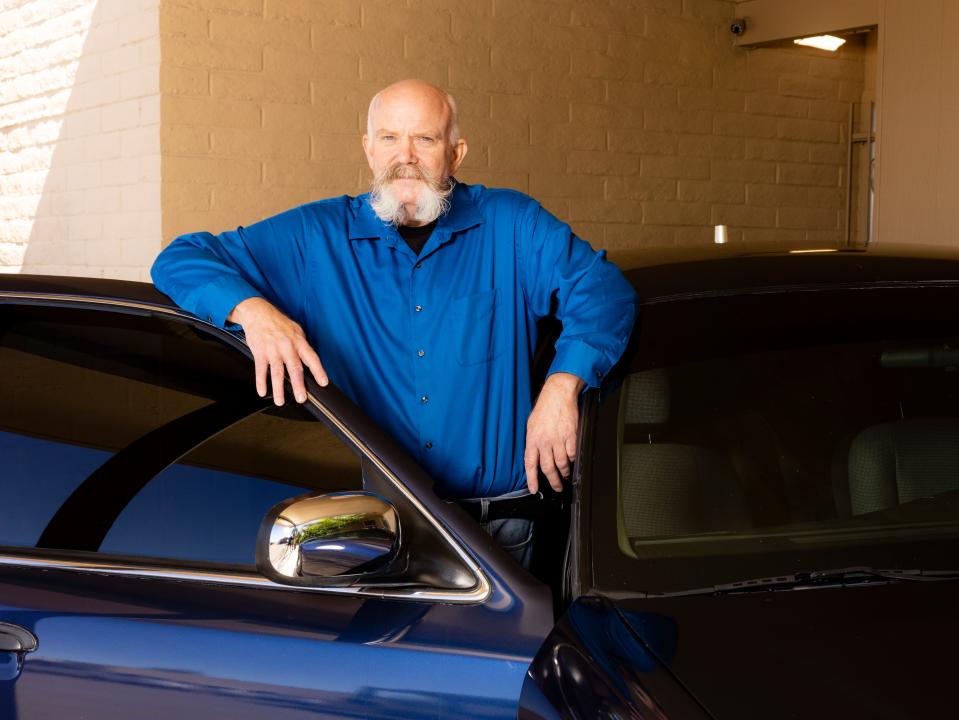
Yet he's astonished that two lenders gave him two loans by using a 16-year-old car as collateral when his Social Security payment of $1,463 a month is just a few hundred dollars above the federal poverty line.
"I'll make every honest effort to make those payments because they will come and take my car away," Hollis said. "I've gone through a repossession already, and I love driving my car."
Have a tip on business or investigative stories? Reach the reporter at craig.harris@usatoday.com or 602-509-3613 or on Twitter @CraigHarrisUSAT or linkedin.com/in/craig-harris-70024030/
This article originally appeared on USA TODAY: Predatory loan interest rates turn one man's desperation into disaster

 Yahoo Finance
Yahoo Finance 